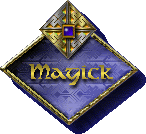


A friend of mine, who is a practising witch, put it best when she said:
"I think we all should have a sense of responsibility...witches or otherwise. I also happen to think that we all need to set a better example. I get really pissed off when I see one of those "witchy" documentaries on television, with someone like Laurie Cabot (not that I dislike her or anything) or someone else all dressed in black, dripping huge pentacles and lots of eyeliner. C'mon, witches…get REAL! How do you expect to be taken seriously when you show up on that there teevee, looking like Lily Munster?? We come from all walks of life, and we need to worry less about shock value and more about appearing to be logical, rational, decent human beings."
Where the stereotypical image of someone dressed in black comes from is not entirely clear. One might say they were depicted as dark, ominous figures. However, any impressions as to their being evil was inflicted upon them by others. To pagans, the concept of black or darkness have nothing to do with evil, but rather of absorption (as well as a symbolic complement to colours representing daylight). Also, it could be that at one time, cultures of them did wear a black uniform to denote affinity to a holy figure, and that - in addition to adopting pagan festivals to Christianity in order to encourage conversion - missionary priests adopted this uniform to rival their spiritual significance.
This classic sketch by Renaissance artist Leonardo da Vinci closely resembles our most popular depiction of a star:

With this image, we see how our bodies have been used to create this star shape; it thereby represents our relationship to the cosmos.
To the Earth religions, each of the five star points represent an element: Earth, Water, Fire, Air, and Spirit. Without these, we could not live. Therefore, the pentagram as a personal icon is a symbol of humanity's existence in balance.
The popular misconception is that a warlock is a male witch. Actually, a male witch is called a witch. "Warlock" means traitor, and the word is not applicable here.
Jews, pagans (including Hindus), Muslims, Buddhists, etc. are not by definition Anti-Christian. They're simply not Christian.
Satanists are monotheisic. Their god is Satan. They are Anti-Christians who worship the Anti-Christ. Their practises and philosophies for the most part involve opposing those of Christianity. They have adopted the image of an inverted cross for a symbol.
Satanists are not recognised by the pagan and magickal communities. It is often overlooked that Satanists have also adopted the image of an inverted pentagram, their symbol of chaos.
Another widely maldefined term. The word "shaman" automatically brings to most people the image of a Native American in full ceremonial dress. However, its true definition is far more generic: It involves perception of alternate planes of existence to access valuable knowledge otherwise not obtainable.
Achieving this state may or may not involve the taking of mind-altering substances to induce this accessibility. Although it is indeed a tradition practised among Native American tribes, Shamanism is also practised among Celtics and many other mystical movements. It is not exclusive to any one culture.

A witch - as mentioned previously - is a pagan practitioner of magick. Wiccan often refers to a particular type of pagan practitioner of magick. The term was coined by the Gardnerians. This sect or "trad" (among many. A "trad" is a particular heirarchy of deities acknowledged, often according to culture. For example, the Strega trad are of Italian descent, and direct their prayers to the Roman gods) was founded in the 20th century, and set forth to establish pagans in the eyes of a modern era as respectable members of society. Many more trads have since adopted the term to identify themselves.
In other words, a Wiccan person can be a witch, but a witch is not necessarily Wiccan. These two terms are both derivations of the Old English word "wicce," which translates into "wise ones." However, the term "Wiccan" is now often used in place of "witch," because the latter tends to conjure somewhat stigmatic imagery among the uninformed.
Website graphics created with love by Moyra's Web Jewels
All original content © D.David


